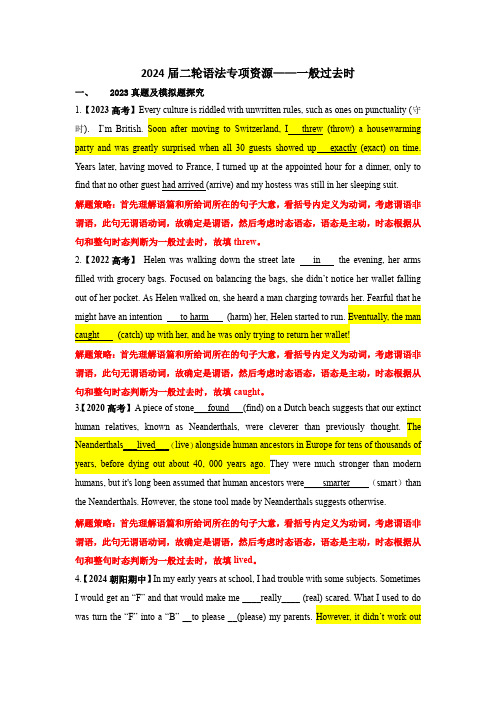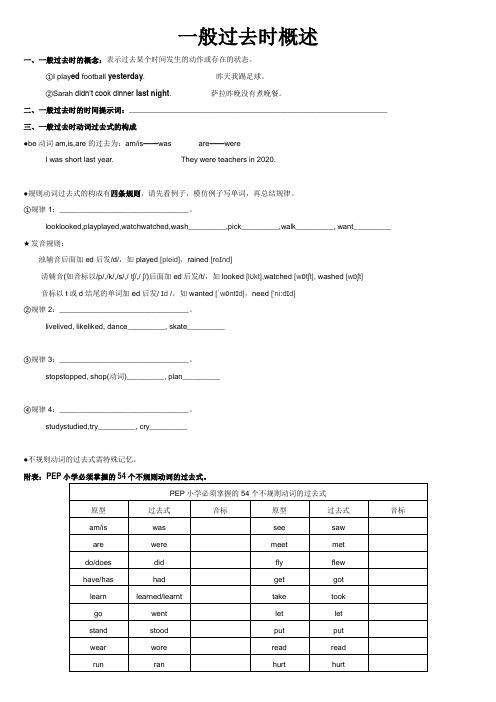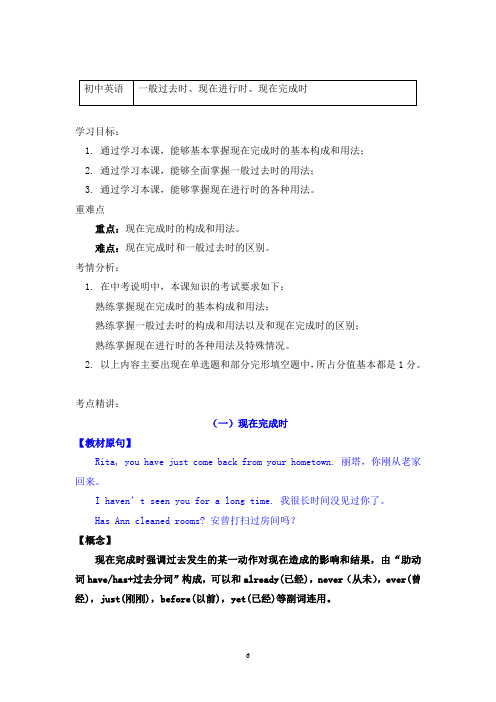一般过去时讲义
高三英语二轮语法专项一般过去时讲义

2024届二轮语法专项资源——一般过去时一、2023真题及模拟题探究Years later, having moved to France, I turned up at the appointed hour for a dinner, only to find that no other guest had arrived (arrive) and my hostess was still in her sleeping suit.解题策略:首先理解语篇和所给词所在的句子大意,看括号内定义为动词,考虑谓语非谓语,此句无谓语动词,故确定是谓语,然后考虑时态语态,语态是主动,时态根据从句和整句时态判断为一般过去时,故填threw。
2.【2022高考】Helen was walking down the street late in the evening, her arms filled with grocery bags. Focused on balancing the bags, she didn’t notice her wallet falling解题策略:首先理解语篇和所给词所在的句子大意,看括号内定义为动词,考虑谓语非谓语,此句无谓语动词,故确定是谓语,然后考虑时态语态,语态是主动,时态根据从句和整句时态判断为一般过去时,故填caught。
3.【2020高考】A piece of stone___found___(find) on a Dutch beach suggests that our extinct human relatives, known as Neanderthals, were cleverer than previously thought. The Neanderthals___lived___(live)alongside human ancestors in Europe for tens of thousands of years, before dying out about 40, 000 years ago. They were much stronger than modern humans, but it's long been assumed that human ancestors were____smarter____(smart)than the Neanderthals. However, the stone tool made by Neanderthals suggests otherwise.解题策略:首先理解语篇和所给词所在的句子大意,看括号内定义为动词,考虑谓语非谓语,此句无谓语动词,故确定是谓语,然后考虑时态语态,语态是主动,时态根据从句和整句时态判断为一般过去时,故填lived。
一般过去时(讲义)-人教PEP版英语六年级下册

一般过去时概述一、一般过去时的概念:表示过去某个时间发生的动作或存在的状态。
①I play ed football yesterday. 昨天我踢足球。
②Sarah didn’t cook dinner last night. 萨拉昨晚没有煮晚餐。
二、一般过去时的时间提示词:______________________________________________________________三、一般过去时动词过去式的构成●be动词am,is,are的过去为:am/is——was are——wereI was short last year. They were teachers in 2020.●规则动词过去式的构成有四条规则,请先看例子,模仿例子写单词,再总结规律。
①规律1:_______________________________。
looklooked,playplayed,watchwatched,wash_________,pick_________,walk_________, want_________ ★发音规则:浊辅音后面加ed后发/d/,如played [pleid],rained [reɪnd]清辅音(如音标以/p/,/k/,/s/,/ tʃ/,/ʃ/)后面加ed后发/t/,如looked [lʊkt],watched [wɒtʃt], washed [wɒʃt]音标以t或d结尾的单词加ed后发/ɪd /,如wanted [ˈwɒntɪd],need ['ni:dɪd]②规律2:_______________________________。
livelived, likeliked, dance_________, skate_________③规律3:_______________________________。
stopstopped, shop(动词)_________, plan_________④规律4:_______________________________。
仁爱版英语九年级上册知识讲义-一般过去时、现在进行时、现在完成时-

学习目标:1. 通过学习本课,能够基本掌握现在完成时的基本构成和用法;2. 通过学习本课,能够全面掌握一般过去时的用法;3. 通过学习本课,能够掌握现在进行时的各种用法。
重难点重点:现在完成时的构成和用法。
难点:现在完成时和一般过去时的区别。
考情分析:1. 在中考说明中,本课知识的考试要求如下:熟练掌握现在完成时的基本构成和用法;熟练掌握一般过去时的构成和用法以及和现在完成时的区别;熟练掌握现在进行时的各种用法及特殊情况。
2. 以上内容主要出现在单选题和部分完形填空题中,所占分值基本都是1分。
考点精讲:(一)现在完成时【教材原句】Rita, you have just come back from your hometown. 丽塔,你刚从老家回来。
I haven’t seen you for a long time. 我很长时间没见过你了。
Has Ann cleaned rooms? 安曾打扫过房间吗?【概念】现在完成时强调过去发生的某一动作对现在造成的影响和结果,由“助动词have/has+过去分词”构成,可以和already(已经),never(从未),ever(曾经),just(刚刚),before(以前),yet(已经)等副词连用。
1. 现在完成时强调过去发生的某一动作对现在造成的影响和结果。
—Have you found him yet ? 你已经找到他了吗?—No, he has probably gone home. 不,他大概已经回家了。
(现在不在这里)2. 现在完成时也可表示开始于过去并持续到现在的动作或状态,可以和表示从过去某一时刻延续到现在(包括“现在”在内)的一段时间的状语连用。
表示持续动作或状态的动词多是延续性动词。
I haven’t seen her these days. 我这些天没有看见过他。
He has taught us since I came to this school. 自从我来到这所学校,他一直教我们。
一般现在时及一般过去时讲义

一般现在时与一般过去时讲义一、一般现在时【No. 1】一般现在时的功能1.表示事物或人物的特征、状态。
如:The sky is blue.天空是蓝色的。
2.表示经常性或习惯性的动作。
如:I get up at six every day.我天天六点起床。
标志性词语:always (一直,总是) often (常常) usually (通常) sometimes(有时) everyday/week/month/year/morning/afternoon/evening/night...3.表示客观现实。
如:The earth goes around the sun.地球绕着太阳转。
【No. 2】一般现在时的构成1. be动词:主语+be(am,is,are) +其它。
如:I am a boy.我是一个男孩。
2.实义动词:主语+实义动词+其它。
如:We study English.我们学习英语。
【注】当主语为第三人称单数(he, she,it)时,要在动词后加"-s"或"-es"。
如:Mary likes Chinese.玛丽喜欢汉语。
【No. 3】一般现在时的变化1.be动词的变化1)否定句:主语be+not +其它。
如:He is not a worker.他不是工人。
2)一般疑问句:Be+主语+其它。
如:-Are you a student? -Yes. I am. / No, I'm not.3)特殊疑问句:疑问词+一般疑问句。
如:Where is my bike?2. 实义动词的变化1)否定句:主语+don't( doesn't ) +动词原形( 其它)。
如:I don't like bread.当主语为第三人称单数时,要用doesn't构成否定句。
如:He doesn't often play.2)一般疑问句:Do( Does ) +主语+动词原形+其它。
小升初语法辨析一般现在时一般过去时一般将来时(讲义)人教PEP版英语六年级下册

小升初英语语法辨析:一般现在时、一般过去时、一般将来时&专项模拟练习一、一般现在时1.定义:表示经常发生的动作、存在的状态或普遍真理。
2.时间标志词:often(经常)、usually(通常)、always(总是)、sometimes(有时)、every day/week/month/year(每天/ 周/ 月/ 年)等。
3.结构:1.主语(非第三人称单数)+ 动词原形。
例如:You play basketball afterschool.(你放学后打篮球。
)2.主语(第三人称单数)+ 动词的第三人称单数形式。
例如:He playsbasketball after school.(他放学后打篮球。
)4.用法:1.表示经常性或习惯性的动作。
如:I go to school by bike every day.(我每天骑自行车去上学。
)2.表示现在的状态或特征。
如:She is tall and thin.(她又高又瘦。
)3.表示客观事实或普遍真理。
如:The earth moves around the sun.(地球绕着太阳转。
)二、一般过去时1.定义:表示过去某个时间发生的动作或存在的状态。
2.时间标志词:yesterday(昨天)、last week/month/year(上周/ 上个月/ 去年)、ago(……以前)、in + 过去的年份等。
3.结构:主语+ 动词的过去式。
例如:You played basketball yesterday.(你昨天打了篮球。
)4.用法:1.表示过去某个时间发生的动作。
如:I went to the park last Sunday.(我上周日去了公园。
)2.表示过去存在的状态。
如:He was happy yesterday.(他昨天很开心。
)三、一般将来时1.定义:表示将来某个时间要发生的动作或存在的状态。
2.时间标志词:tomorrow(明天)、next week/month/year(下周/ 下个月/ 明年)、in the future(在未来)等。
六年级上册英语-一般过去时讲义知识点 练习 沪教牛津版

一般过去时概念:一般过去时表示过去某个时间发生的动作或存在的状态,常和表示过去的时间状语连用。
一般过去时也表示过去经常或反复发生的动作。
重点:一般过去时态概念、用法及动词过去式变化规则难点:一般过去时的句子如何变为一般疑问句和特殊疑问句Be动词的一般过去时态变化⑴am 和is在一般过去时中变为was。
(was not=wasn’t)⑵are在一般过去时中变为were。
(were not=weren’t)⑶带有was或were的句子,其否定、疑问的变化和is, am, are一样,即否定句在was或were 后加not,一般疑问句把was或were调到句首。
句中没有be动词的一般过去时的句子肯定句:动词用一般过去时态,如:Jim went home yesterday.否定句:didn’t +动词原形,如:Jim didn’t go home yesterday.一般疑问句:在句首加did,句子中的动词过去式变回原形。
如:Did Jim go home yesterday?特殊疑问句:(1)疑问词+did+主语+动词原形?如:What did Jim do yesterday?Where did Jim go yesterday?⑵疑问词当主语时:疑问词+动词过去式?如:Who went home yesterday?动词过去式变化规则1.一般在动词末尾加-ed,如:pull-pulled, cook-cooked2.以e结尾的动词,直接加-d,如:taste-tasted3.以重读闭音节(即:辅音+元音+辅音)结尾且末尾只有一个元音字母和一个辅音字母的动词,双写末尾的辅音字母,再加-ed,如:stop-stopped4.以“辅音字母+y”结尾的,变y为i,再加-ed,如:study-studied5.不规则动词过去式:am,is-was,are-were, do-did, see-saw, say-said, give-gave,get-got, go-went, come-came, have-had, eat-ate,take-took, run-ran, sing-sang, put-put, make-made,read-read, write-wrote, draw-drew, drink-drank, fly-flew, ride-rode, speak-spoke, sweep-swept, swim-swam, sit-sat一.过去时练习。
学而思英语一般过去时讲义总结及习题(有答案)

一般过去时一般过去时描述过去发生的事肯定句、否定句、疑问句I was in a quiet street.I was not in a quiet street.Was I in a quiet street? (Were you in a quiet street?)I had a dream last night.I didn’t have a dream last night.Did I have a dream last night? (Did you have a dream last night?)动词过去式变化规则动词过去式,ed来结尾一般直接加,见e只加d辅y结尾y变i,再加ed 重读辅元辅,双写尾字母常见不规则动词过去式大全时间标志词yesterday …ago last… the day before yesterday just now this morning in 2008大显身手1.There _________ (be) no one here a moment ago.2.Helen and Nancy _________ (be) good friends, but now they are not.3.I listened but ___________ (hear) nothing.1.How is Jane yesterday? ________2.He go to school by bus last week. ________3.I can fly kites seven years ago. ________4.Did you saw him just now. ________5.Tom wasn't watch TV last night. ________6.I did not my homework yesterday. ________Keys:1.was 2.were 3.heard1.is→was2.go→went3.can→could4.saw→see . →?5.wasn’t→didn’t6.did not后面加do测试题一、写出下列动词的第三人称单数形式、过去式形式go_______ _______ enjoy_______ _______buy_______ _______ like_______ _______get _______ _______ walk_______ _______take_______ _______ dance_______ _______write_______ _______ run_______ _______swim_______ _______ find_______ _______begin_______ _______ eat_______ _______play_______ _______ study_______ _______二、单项选择1.I ______________ my room last Sunday.A.cleaned B.clean C.am cleaning D.cleans2.What ______________ Mike do last weekend?A.do B.does C.is D.did3.______________ you ______________ TV last night.A.Do, watch B.Did, watch C.Did, watched D.Does, watches4._____________ he ____________ football two days ago?A.Does, play B.Did, played C.Did, play D.Does, playing5.They _______________ on a trip in February, 2007.A.are going B.going C.went D.goes6.She watered the flowers _______________.A.tomorrow B.sometimesC.yesterday morning D.every morning7.Mike_____________ a big tiger in the nature park last year.A.saw B.see C.seeing D.seen8.------ Good afternoon, Miss Lee. How does Mike feel?------ He’s tired. He ____________ a lot of work ______________ .A.does, this morning B.do, this morningC.did, this morning D.have, this morning三、找出以下短文中的动词过去式,并将其对应的动词原形写出来The City Mouse and the Country MouseOnce there were two mice. They were friends. One mouse lived in the country; the other mouse lived in the city. After many years the Country mouse saw the City mouse; he said, "Do come and see me at my house in the country." So the City mouse went. The City mouse said, "This food is not good, and your house is not good. Why do you live in a hole in the field? Y ou should come and live in the city. You would live in a nice house made of stone. You would have nice food to eat. You must come and see me at my house in the city."The Country mouse went to the house of the City mouse. It was a very good house. Nice food was set ready for them to eat. But just as they began to eat they heard a great noise. The City mouse cried, " Run! Run! The cat is coming!" They ran away quickly and hid.After some time they came out. When they came out, the Country mouse said, "I do not like living in the city. I like living in my hole in the field. For it is nicer to be poor and happy, than to be rich and afraid."一、答案:go _goes______ __went_____ enjoy __enjoys___ __enjoyed__ buy _buys______ __bought__ eat _eats______ __ate_____get _gets______ __got_____ walk _walks___ _walked___ take _takes______ _took______ dance __dances__ __danced__ write _writes____ __wrote_____ run __runs_____ __ran_____ swim _swims____ __swam_____ find __finds____ __found___ begin _begins___ ___began____ like __likes_____ _liked______ play _plays____ __played____ study __studies__ __studied_____二、答案:A D B C C C A C三、答案:一、get ______gets_______ sit _____sits_________ come ______comes______ drive _____drives_______ fly ______flies________ study ____studies_______ wash ______washes_____ watch ____washes_______ go ______goes________ do ____does_________ 二、C C B C B三、1. Tony doesn’t watch TV every evening.2. Does Amy like playing computer games?3. What does Tom do at home?4. Where does Mingming like taking photos?5. Sun Y ang doesn’t wash any clothes on Saturday.Does Sun Yang wash clothes on Saturday?Yes, he does. / No, he doesn’t.What does Sun Yang do on Saturday?。
一般过去时复习ppt上课讲义

行为动词在一般过 去时中的应用:
每天早餐我吃鸡蛋和牛奶。 I _h_a_ve_ eggs and milk for breakfast every day .
昨天,早餐我吃面条。 I _h_a_d_ noodles for breakfast yesterday
A. write B. writed C. wrote
2. Everything __B_ ready before
Father came.
A. were B. was
C. is
3.He always __A___me last term(学期).
A. helped
B. helps C. help
4. —Tim ___B___ the math test last weekend. What about
study — studied
5.不规则变化.(见不规则动词表P142)
规则动词过去式-ed的发音
1.在以清辅音结尾的规则动词后,
-ed读作/ t / worked
/w3:k/t/
2.在以浊辅音或元音结尾的规则动词后
, -ed读作/d /
lived /lIv d//
play ed /pleI d//
3.在以/t/或/d/结尾的规则动词后,
-ed读作/Id /
visit ed /’vIzIt I/d/
finished /t/ enjoyed /d/ shouted /Id/ moved /d/
helped /t/ wanted /Id/ called /d/ needed /Id/
- 1、下载文档前请自行甄别文档内容的完整性,平台不提供额外的编辑、内容补充、找答案等附加服务。
- 2、"仅部分预览"的文档,不可在线预览部分如存在完整性等问题,可反馈申请退款(可完整预览的文档不适用该条件!)。
- 3、如文档侵犯您的权益,请联系客服反馈,我们会尽快为您处理(人工客服工作时间:9:00-18:30)。
一般过去时(simple past tense))
一、定义:表示过去某个时间里发生的动作或状态;过去习惯性、经常性的动作、行为;过去主语所具备的能力和性格。
二、标志词:
ago(two hours ago(一段时间+ago),yesterday(句子开头或结尾),the day before yesterday,last week,last(year,night,month…),具体确定的过去时间(in2012),just now,at the age of,one day,long ago,once upon a time(很久以前),and so on,this morning.long long ago.
二、过去式变化规则:
1.直接加ed:work—— worked look——looked play——played,
2.以e结尾的单词,直接加d:live ——lived hope——hoped use——used, 3 以辅音字母+y结尾的,变y为i加ed:study—— studied carry——carried worry——worried,
4以元音字母+y结尾的,直接加ed:enjoy ——enjoyed play——played
5 以重读闭音节结尾的,双写最后的辅音字母+ed:stop—— stopped plan——planned
不规则变化:
do>did see>saw make>made take>took eat>ate
read>read put>put get>got hear>heard feel>fel
sit sat run ran go went drive drove buy bought break broke
否定句:主语+didn't +动词原形+宾语
如:I didn't go home yesterday. (我昨天没回家。
)
疑问句:Did +主语+动词原形+宾语
如:Did you go home yesterday? (你昨天回家了吗?)
肯定回答:Yes,I did. (是的,我回了。
)
否定回答:No,I didn't. (不,我没回家。
)
3.助动词和情态动词过去式如下:
shall―should(将要)用于第一人称单数
will―would(将要)用于所有人称
can—could(能,会)may―might(可以)must―must (必须)
have to―had to(不得不)
助动词和情态动词的过去时态要使用他们的过去式,后面的动词还使用原形。
如:I had to do my homework yesterday. (昨天我不得不做作业。
)
一般过去时讲解
一般过去时也叫单纯过去时。
例A:He worked very hard last year.
(去年他很用功。
)
例B:Mr. Smith bought a new car yesterday.
(史密斯先生昨天买了一辆新车。
)
例C:They were here only a few minutes ago.
(几分钟前他们还在这里。
)
注意:
1.在谈到已死去的人的情况时,多用过去时。
2.表示过去一段时间内经常或反复的动作。
常与always,never等连用。
Mrs. Peter always carried an umbrella.
彼得太太过去老是带着一把伞。
(只是说明她过去的动作,不表明她现在是否常带着伞。
)
比较
Mrs. Peter always carries an umbrella.
彼得太太老是带着伞。
(说明这是她的习惯,表明她现在仍然还习惯总带着一把伞)
Mrs. Peter is always carrying an umbrella.
彼得太太总是带着一把伞。
(表示说话者对这一动作或行为厌烦)
I never drank wine.我以前从不喝酒。
(不涉及到现在,不说明现在是否喝酒)
3.如果强调已经终止的习惯时要用used to do(过去常常做,而现在不那样做了)
He used to drink alcohol.
他过去喝酒。
(意味着他现在不喝酒了。
喝酒这个动作终止了)
I used to take a walk in the morning.
我过去是在早晨散步。
(意味着现在不在早晨散步了)
比较:
I took a walk in the morning.
我曾经在早晨散过步。
(只是说明过去这一动作)
4.有些句子,虽然没有表示过去确定时间的状语,但实际上是指过去发生的动作或存在的状态的话,也要用过去时,这一点,我们中国学生往往出错,要特别注意!
I didn''t know you were in Paris.
我不知道你在巴黎。
(因为在说话时,我已经知道你在巴黎了。
这句话指的是说话之前,所以只能用过去时表示。
实际上,这句话暗指:But now I know you are here.)
I thought you were ill.
我以为你病了呢。
(这句话应是在说话之前,我以为你病了。
但是现在我知道你没病)
过去的概念:
我说话这会儿之前发生的动作都叫过去的动作。
He was here only a few minutes ago.
(仅仅几分钟前他还在这里。
)
I came home just now.
(我刚回到家。
)
I got up very early this morning.
He was late for school again today.
1.r. Mott is out. But he ______ here a few minutes ago.
A. was
B. is
C. will be
D. would be
解析:几分钟前发生的动作,应该用一般过去时。
应选A,
2.---Hi,Tom.
---Hello,Fancy. I ______ you were here.
A.don't know
B.won't think
C. think
D. didn't know
解析:虽然句中没有明确的时间状语,但是可以通过上下文语境判断出,我说这话之前不知道,但是现在知道了,表示过去的动作,要用过去时态。
所以选D。
3.He promised to tell me by himself when I ______.
A. come
B. would come
C. came
D. had come
解析:在时间状语从句中,用一般过去时表示过去将来。
应选C。
